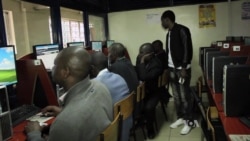Kenya's Communications Authority has issued a rule requiring all Internet users at cybercafes to produce identification cards or birth certificates.The authority says the move is designed to curb hacking and terrorism, but critics say it infringes upon constitutionally guaranteed freedoms.
Dennis Mulandi, 24, a Nairobi entrepreneur, has run the Beats Cyber Café for four years. On average, about 100 customers frequent his establishment each day — but they'll now have to show an ID to go online.
Mulandi said the government's concern is misplaced.
"You find there are other people who have their laptops at their houses, they have their Internet," he said. "So those people ... may be the ones hacking the government, not the people who are coming to the cybers, because we know all our clients.”
Vincent Ochieng, a frequent customer of cybercafes, said such establishments offer the convenience of accessing the Internet at an affordable price. The new rule, he said, will restrict freedoms guaranteed in Kenya's constitution.
“They are a violation to our freedom of association, freedom of movement, and I believe it will curtail many businesses, because we want to feel free," Ochieng said. "If you’re going to browse, if you’re going to exchange information, we don’t want to be like the police is watching over us.”
Dr. Felix Odimmasi, an expert on international law and diplomacy at the University of Nairobi, said he doubted the new law would have the desired effect.
“They are not going to curb terrorism, because terrorists do not necessarily use cybercafes," Odimmasi said. "I don’t think there are any cases that have been investigated that link terrorism to the use of cybercafes especially.”
Kenya's Communications Authority declined several requests to be interviewed for this story.





